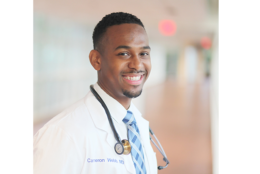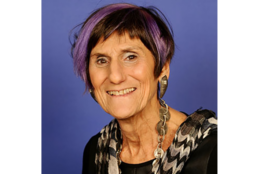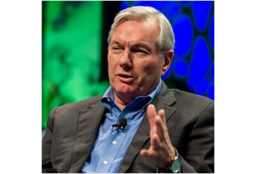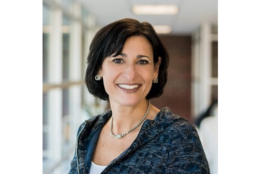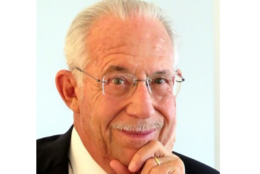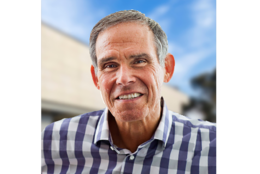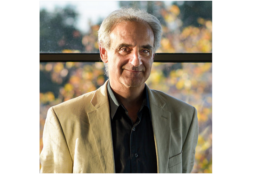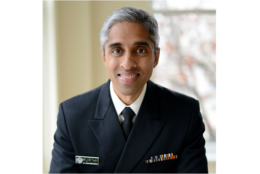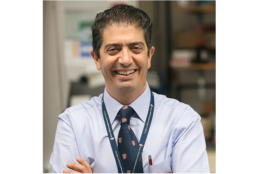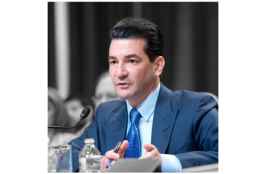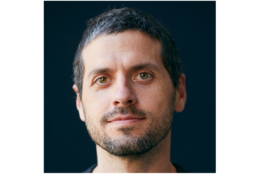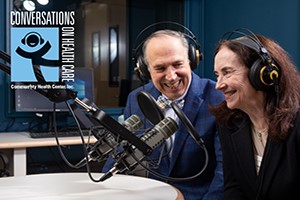Conversations on Health Care
-
Dr. Cameron Webb, White House Senior Policy Adviser for COVID-19 Equity, is navigating a tricky situation — as he advocates for vaccines, the university where he works just dropped its student vaccine mandate. Webb tells Conversations on Health Care hosts Mark Masselli and Margaret Flinter that he realizes the University of Virginia has some new dynamics to navigate. “There’s this rush to roll back a lot of the strategies that have gotten us to a point where we’re seeing less death,” he says. “This pandemic has been politicized to a point that it’s indistinguishable from the rest of our political rhetoric…rhetoric often meant to motivate a voter base.” Webb also discusses the administration’s efforts to address COVID equity issues, including the need to collect better data about race and ethnicity vaccination rates.
February 14, 2022 -
This week hosts Mark Masselli and Margaret Flinter speak with Congresswoman Rosa DeLauro (D-CT), Chair of the House Appropriations Committee, on her expectations for finding consensus on revised Build Back Better legislation. She says the expanded Child Tax Credit has lifted millions of American children out of poverty, significantly easing economic pressures on working families, and should be restored. She also discusses the President’s infrastructure law, which she says will have a dramatic impact on the nation’s aging transportation and clean water delivery systems, as well as create new jobs.
January 31, 2022 -
This week, hosts Mark Masselli and Margaret Flinter welcome renowned epidemiologist Dr. Michael Osterholm, Director of the Center for Infectious Disease Research and Policy (CIDRAP) at the University of Minnesota, who has served 5 presidential administrations in preparing for pandemics and bio-terror threats. Dr. Osterholm says the highly infectious omicron variant will continue to threaten hospital systems, schools and supply chains, warning the threat of future variants that may evade immunity is still a very real concern. He predicts that a combination of improved vaccines and new therapeutics will render COVID more manageable in the future, but that we will have to learn to 'live with it'.
January 24, 2022 -
This week, hosts Mark Masselli and Margaret Flinter welcome CDC Director Dr. Rochelle Walensky, addressing confusion and frustration around lack of rapid COVID tests and need for more N95 masks for the public. She talks about the shifting plan of action from the Biden Administration in response to the dramatic surge in omicron-driven COVID cases, and the scaled up efforts to make rapid tests and high quality masks available to all Americans.
January 18, 2022 -
This week, hosts Mark Masselli and Margaret Flinter speak with Dr. Peter Hotez, Dean of the National School of Tropical Medicine at the Baylor College of Medicine, and co-creator of a new, low-cost vaccine for COVID-19. Dr. Hotez discusses plans for Corbevax, a recombinant protein vaccine shown to be highly protective against COVID-19, which has just been given Emergency Use Authorization by the Indian government. Dr. Hotez’s plan is to make the formula available to poor and developing countries around the world, without any expectation of payment, to accelerate the pace of global vaccinations and bring the pandemic to an end. He also offers important advice to families with children navigating the omicron surge while heading back to school.
January 06, 2022 -
This week hosts Mark Masselli and Margaret Flinter speak with renowned virus expert Dr. William Haseltine who has ‘grave concerns’ about Merck’s oral COVID drug Malnupiravir, which recently won narrow approval from the FDA advisory panel. He says the drug unleashes ‘dangerous’ mutations that could evolve the virus beyond control. He’s also urging extreme caution as the highly infectious omicron variant is sweeping across the US, saying it could be as deadly as the delta variant and that boosters may offer only limited protection of 3 months. Dr Haseltine, who developed the Anthrax vaccine and is President of ACCESS Health International, says public health protocols of masking, rapid testing and social distancing should be put back in place during this next surge.
December 20, 2021 -
This week hosts Mark Masselli and Margaret Flinter welcome Dr. Eric Topol, Director of the Scripps Research Translational Institute, for his perspective on the rapid spread of the Omicron variant. He says early data shows that it is highly transmissible, but apparently not more deadly. His greater concern is around the current Delta surge leading to more infections, low vaccination rates in developing countries leading to more variants, and the “abysmal” vaccination performance in the U.S. He says mRNA vaccines should be considered a 3-dose protocol, and that rapid testing and virus sequencing should be more broadly deployed to stop the spread of the virus.
December 13, 2021 -
Mark Masselli and Margaret Flinter examine the latest details about the omicron COVID variant, including the important role community health centers continue to play in the pandemic. In addition, we revisit their recent conversation with Planned Parenthood Federation of America President and CEO Alexis McGill Johnson on the Supreme Court hearing on the Mississippi law banning abortion after 15 weeks, posing the greatest threat to Roe v. Wade in half a century. She also talks about systematic efforts in many states limiting women's access to abortion, and examines the previous administration’s Title X abortion ‘gag’ rule, which seriously impeded access to reproductive health services, creating particular hardship for vulnerable women. She expects the conservative-leaning high court will ultimately rule to undermine Roe.
December 06, 2021 -
This week, hosts Mark Masselli and Margaret Flinter speak with Gary Cohen, Founder of Health Care Without Harm, an award-winning global non-profit seeking to create an environmentally-responsible health system. Winner of the MacArthur Foundation’s ‘Genius Grant’ for his work reducing the health industry's pollution footprint, he says the COP26 UN Climate summit in Glasgow didn’t go far enough to hold global warming to 1.5 degrees Fahrenheit, which means a billion people will be exposed to dangerous heat stress. Mr. Cohen says the recently-passed bipartisan infrastructure bill makes some progress addressing climate change, but that the President’s Build Back Better Act could have a dramatic impact. He says de-carbonizing the nation's health industry will build healthier communities and address health inequity.
November 22, 2021 -
This week hosts Mark Masselli and Margaret Flinter speak with Glen de Vries, Vice Chair for Health and Life Sciences at Dassault Systèmes and Founder and former CEO of Medidata, the first cloud based system supporting global clinical trials research. An astronaut aboard Jeff Bezos’ recent Blue Origin rocket flight with William Shatner of Star Trek fame, de Vries points to the scientific advances from the nation’s space program fueling the technologies that now support telehealth and precision medicine. Also author of The Patient Equation, he predicts a dramatic period of exponential growth in scientific and biologic discovery post-pandemic.
November 15, 2021 -
This week, hosts Mark Masselli and Margaret Flinter speak with Planned Parenthood Federation of America CEO Alexis McGill Johnson, on upcoming Supreme Court hearing on S.B.8., the Texas law banning abortion after 6 weeks. She discusses the record number of restrictive abortion laws across the country causing harm to patients and clinicians committed to providing family planning services, and the former administration’s Title X abortion ‘gag’ rule, which greatly hampered access to legally-guaranteed ‘right to choose’. She expects Roe-v-Wade will likely be permanently compromised with the current conservative configuration on the nation’s High Court.
November 01, 2021 -
This week hosts Mark Masselli and Margaret Flinter welcome “the Nation’s Doctor,” US Surgeon General Dr. Vivek Murthy, Co-chair of President Biden’s White House COVID Task Force. Dr. Murthy explains the FDA’s latest approval for mixing vaccine brands for booster shots. He also addresses White House plans to roll out COVID vaccine support for the nation’s 5-11-year-olds pending FDA approval, and how vaccine requirements are ‘turbocharging’ vaccination rates. Dr. Murthy examines the growing crisis of unmet mental health needs, addiction, and overdose in this country, exacerbated by the pandemic. He also discusses an initiative he’s creating to address burnout in the health care profession.
October 25, 2021 -
This week we speak with Dr. Ofer Levy, Director of the Precision Vaccines Program at Boston Children’s Hospital, Professor of Pediatrics at Harvard Medical School and member of the FDA COVID Vaccine Advisory Panel. He talks about the recent decision to reject boosters for all recipients 16 and older, saying they didn’t have enough data for younger populations to make that recommendation. He says the review process for emergency authorization for young children aged 5-to-11 will be thorough, rigorous and transparent to the public. His team is also currently working on developing a COVID vaccine, as well as other vaccines that could be deployed for cancer and even opioid use disorder and fentanyl overdose.
October 18, 2021 -
This week, hosts Mark Masselli and Margaret Flinter speak with former FDA Commissioner Dr. Scott Gottlieb whose new book outlines America’s epic failure in our response to the pandemic, leading to more than 700,000 deaths. “Uncontrolled Spread: Why COVID-19 Crushed Us and How We Can Defeat the Next Pandemic” examines the inherent flaws at the Centers for Disease Control and Prevention and other public agencies that left us vulnerable to the raging pandemic. Dr. Gottlieb says the CDC and other agencies should be re-tooled to conduct more agile global disease surveillance, and that emerging therapeutics like Merck’s new oral COVID drug will be a game changer for treatment moving forward.
October 11, 2021 -
This week hosts Mark Masselli and Margaret Flinter speak with Dr. Michael Mina, Epidemiologist and member of the Center for Communicable Disease Dynamics at Harvard where they are taking a multi-disciplinary approach to tackling the ongoing pandemic. Dr. Mina has long been a proponent of making cheap, rapid, at-home COVID tests available to all Americans as a much more effective way to curtail the pandemic’s spread. He says these tests which have been deployed successfully in other countries, are almost 100 per cent effective in identifying potential infectious ‘super-spreaders’, and that government should classify them as a public health, not a medical, tool to allow for more swift production and deployment. He also discusses their efforts to build a global surveillance system for future disease outbreaks.
October 04, 2021

